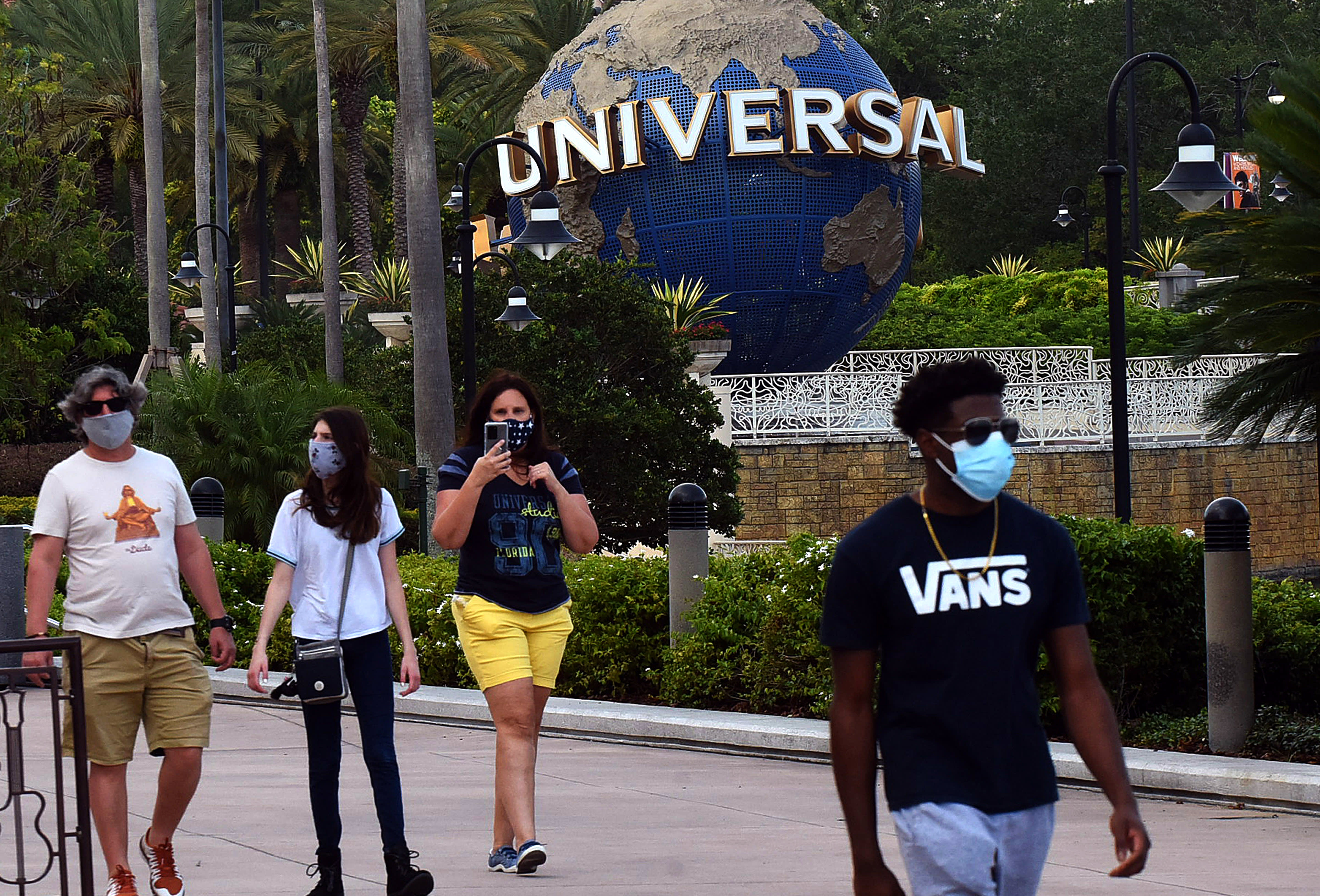Guests wearing face masks visit the Universal Orlando’s CityWalk as sections of the entertainment and retail district opened today for limited hours for the first time since Universal Orlando closed on March 15, 2020 due to the coronavirus pandemic.
Paul Hennesy | Barcroft Media | Getty Images
More than a century ago, judges in Missouri and Minnesota came to the same conclusion: if you attend a baseball game, you acknowledge the risk that you could get hit by a baseball.
In 2020, the baseball game is any public place and the baseball is coronavirus.
As businesses seek to reopen their doors to customers, safety measures, like masks, temperature checks and social distancing, have been put in place, but these rules don’t mean the risk of contracting Covid-19 is zero.
That’s why businesses big and small are issuing statements and putting up signage to tell patrons that there is an inherent risk of exposure to coronavirus in a public place.
Signs have been posted at public parks, dental offices and YMCA locations across the country. Some of the most prominent brands to issue these assumption of risk statements are Disney and Universal. The two companies have reopened parts of their shopping centers in Florida and are preparing to reopen their theme parks in the coming weeks. Both have warned parkgoers and shoppers that by entering their premises, they have assumed the risk of contracting Covid-19.
“The parks have a responsibility to make it reasonably safe,” Barry Kantrowitz, partner at Kantrowitz, Goldhamer & Graifman, a law firm in New York, said. “They are going to clean the entire park, so that the park itself does not create an infectious area. They are going to screen their employees as best they can, so that the people working in the park, as the best the can tell, don’t have the virus.”
“Those are all reasonable steps,” Kantrowitz, who has specialized in civil litigation and personal injury law for the last 35 years, said. “Everything so far that they are doing is reasonable during these circumstances.”
Universal declined to comment. Representatives for Disney did not immediately respond to CNBC’s request for comment.
Source: Universal Orlando Resort
Theme parks are no strangers to providing assumption of risk warnings. For decades, roller coasters and rides have come with safety warnings, advising people who are pregnant, have a back injury or are sensitive to strobe lights to partake at their own risk.
Parks have done this in the past to prevent customers from claiming that they were not aware of the risks and saying that the park was negligent. It’s the same sentiment when warning patrons about the risk of contracting Covid-19.
However, just because the possible risks are posted doesn’t mean that companies can’t be held liable for an injury sustained by a visitor, said David Wolf, a Florida-based attorney at Wood, Atter & Wolf, which specializes in child injury and safety.
Wolf used the example of a trampoline gym, which often requires patrons to sign release waivers. A customer who sprains their ankle jumping on the trampolines knew there was a risk that they could injure themselves while jumping and playing in the space. Therefore, they wouldn’t have a negligence case.
However, if the trampoline wasn’t properly tended to by the company — say its springs weren’t replaced or there was something structurally wrong with the device, and a customer was injured, then the company could be found to be negligent.
Both Wolf and Kantrowitz said that assumption of risk law seems very simple at the surface, but that it can actually be quite complicated, especially when it comes time to put a case in front of a judge.
That complication increases when coronavirus is involved. Plaintiffs would have to prove that they contracted the virus at a specific location and that the business in question didn’t adhere to safety standards.
“It’s like the Wild West with what the courts are going to do with Covid,” Wolf said. “How do you prove where you got it if you are out in the public?”
A security employee checks the body temperature of a guest before allowing him to enter at the Universal Orlando’s CityWalk as sections of the entertainment and retail district begin to open for limited hours for the first time since Universal Orlando closed on March 15, 2020 due to the coronavirus pandemic.
Paul Hennessy | Barcroft Media | Getty Images
Perhaps one of the most equitable examples for coronavirus would be the norovirus outbreaks that sickened more than 1,100 patrons of Chipotle Mexican Grill between 2015 and 2018.
While restaurants can issue statements on menus stating that patrons assume the risk of eating undercooked food, it was found that Chipotle’s food safety protocols were lacking and employees who were sick were not being sent home by their managers. Chipotle ended up paying a $25 million criminal fine.
In the case of coronavirus, a person would have to prove that safety measures weren’t being followed by a company. If an employee buckling patrons into a ride at a theme park, for example, was visibly sick, coughing and had a fever, but his manager didn’t send him home, then maybe a case could be brought, Kantrowitz said.
“When places are held responsible, it’s because they are negligent,” he said. “They haven’t acted reasonably under the circumstances.”
Disclosure: Comcast is the parent company of NBCUniversal and CNBC.
